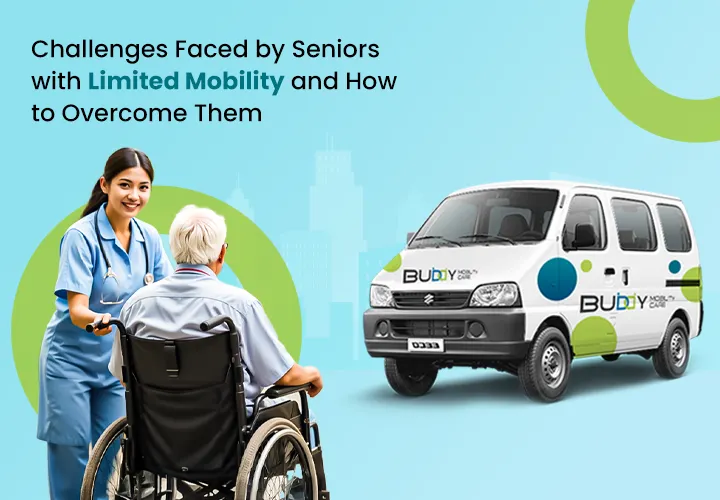Challenges Faced by Seniors with Limited Mobility and How to Overcome Them
Introduction
Physical challenges are common during ageing, and restricted mobility is one of the most common issues among elders. Many seniors face difficulties attending medical appointments, carrying out daily chores and maintaining social connections because of their mobility hindrances. At Buddy, we understand the importance of mobility solutions and bring you the latest cars with wheelchair access and other solutions to quickly move your loved ones.
Read on to learn more about the causes of limited mobility, senior transportation problems, and how carers can use technology solutions to help maintain mobility and independence.
Common Causes of Limited Mobility for Seniors
Older adults have several different factors reducing their mobility, like:
- The inflammatory condition of arthritis creates severe discomfort when seniors try to walk or stand.
- Osteoporosis leads to fragile bones, raising the chance of bone fractures, thus restricting movement.
- Medical conditions such as Parkinson’s disease, multiple sclerosis and strokes result in impaired coordination and muscle control in seniors.
- The increased risk of falling among seniors, which may injure them and lead to fractures or sprains, further limits their mobility.
Understanding these causes can help caregivers in making personalised plans to help their senior clients with mobility issues.
Transportation Difficulties
It becomes difficult for seniors to move around as options for transportation supporting their different needs are not readily available. Some key difficulties are:
- Standard vehicles lack features to accommodate individuals having restricted movement abilities.
- Private transport services with personal drivers and taxis are increasingly costly with time.
- Seniors who can’t drive depend on their family members for transportation, but this is not always practical.
- Wheelchair-accessible taxi service needs prior bookings as they may not be available immediately when the need arises.
Role of Caregivers in Supporting Mobility
Limited-mobility seniors can receive the much-needed travel support from carers like us who ensure they can move around safely. Their responsibilities include:
- Supporting physical activities like helping elderly people move from one place to another between wheelchairs, beds or vehicles.
- Carers can help seniors maintain mobility by reminding them to exercise daily and perform other activities like stretching, walking, and water therapy.
- Caregivers should book a senior-friendly transport service in advance for a better travel experience for the senior.
- Caregivers can suggest a number of modifications to make the living areas more accessible, such as ramp installations, grab bars, stairlifts, and non-slip flooring solutions.
In addition to the above, we feel that people with mobility challenges need emotional support from carers who should motivate them and create opportunities for seniors to engage socially.
By implementing changes that enhance their mobility and independence, caregivers can improve the quality of life of seniors.
Technological Innovations for Mobility Support
Modern technological progress has completely transformed how people with limited mobility can carry out their daily activities and travel to different places. Some of these technological advancements are:
Senior citizens benefit from using electric wheelchairs and mobility scooters to move freely indoors and outdoors without assistance.
We offer wheelchair-accessible taxi service and can be booked on our app, which seniors can use to easily fulfil their transportation needs.
- Vehicle modifications like making wheelchair-accessible cars equipped with ramps, lifts and swivel seats are available to make entering and exiting vehicles easier.
- Stairlifts and platform lifts allow the elderly to move between floors without facing difficulties on stairs.
- Wearable health monitors, such as smartwatches, measure user movements and heart rate and track falls to alert caregivers in emergency situations.
- Robotic assistance devices like walking robots and exoskeletons are also available to help disabled senior citizens regain mobility and independence by using them.
Seniors can use these innovative technologies to recover mobility and live more independently without sacrificing safety and security.
Conclusion
All the options available to provide support to seniors can overcome the challenges of restricted mobility. Seniors benefit from our cars with wheelchair access, carer assistance, and technological aids in maintaining their freedom to lead independent, fulfilling lives. The right mobility aid can help seniors stay active and stay in touch with their friends and family, as they can move around confidently despite mobility restrictions.




